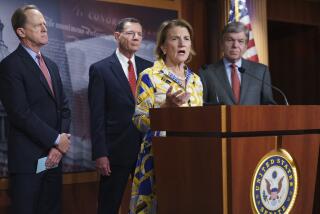Controversial Fee Still an Option : Bush Message to Congress May Lack Plan for Thrifts
- Share via
WASHINGTON — President Bush, embroiled in a furor over a controversial savings tax option, may not be ready to present a specific plan for dealing with the nation’s savings and loan crisis in the budget message he delivers to Congress next week, the White House said Monday.
Bush has not yet received drafts on any of the options being prepared by Treasury Secretary Nicholas F. Brady for a thrift industry rescue, White House Press Secretary Marlin Fitzwater said.
However, one senior White House official, referring to the cost of resolving the problem, predicted: “The taxpayers are going to take a hit, one way or the other.”
And expressing pique at congressional opposition to the savings fee proposal, he added: “All those people are up there dumping on it. Let’s hear their solutions. I’d love to hear some solutions from Capitol Hill. If there’s going to be a true partnership, it’s incumbent on them to bear some burden of responsibility.”
Estimates on the cost of the effort have ranged from $45 billion to $110 billion. The options under consideration appear to range from a direct bailout by the government to additional fees or insurance premiums paid by the institutions and depositors.
In his speech to Congress on Feb. 9, the President plans to outline his proposed shifts in the 1990 federal budget submitted three weeks ago by former President Ronald Reagan. Fitzwater said that Bush will raise the savings and loan crisis in the address, “but how specific it’ll be remains to be seen.” A detailed explanation of his savings and loan proposal could risk overshadowing the other elements in the budget plan.
Despite the uproar in Congress that followed the disclosure of one option--imposition of an insurance fee of 25 to 30 cents for each $100 of depositors’ accounts in banks and thrift institutions--the President and his chief of staff, John H. Sununu, have made it clear that no proposals are being ruled out.
But one official, seemingly ready to distance the White House from the controversial proposal, said: “It’s not alive or dead. It’s in the planning stage at the Treasury Department.”
Congressional criticism of the plan continued unabated Monday.
Sen. Alan J. Dixon (D-Ill.), chairman of the Senate Banking, Housing and Urban Affairs Committee’s subcommittee on consumer and regulatory affairs, said in a television interview that the idea was “born dead.”
“Read my lips: ‘It’s a tax,’ ” Dixon said, paraphrasing the no-tax pledge Bush made a centerpiece of his presidential campaign. “It’s just that simple. It’s a tax of 30 cents on every $100 worth of deposits.”
Seeking to explain the White House reluctance to abandon the proposal in the wake of the congressional uproar, one senior White House official said that “constraining our options is the worst thing we can do. If you start ruling out options, you’re left with a direct federal bailout, which would jack up the deficit.”
The official, meanwhile, said that while specific budget decisions are still several days away, it is clear that Bush would recommend no more than a slight boost in the $5.14 billion that Reagan proposed for the nation’s anti-drug program. “We’re going to be around where Reagan was, maybe a bit more,” he said.
Emphasizing, as Bush has, the need for greater education about drug abuse as the focus of the nation’s long-range program, he said: “Let’s face it. There are a lot of things that can be done by the federal government well, but curing people of drug addiction isn’t one of them.”
The President spent a full day at work despite a persistent cold that Fitzwater said was being treated with decongestants.
He had a “shirt-sleeve” meeting with staff members to discuss the programs that he wants to see evolve from his campaign emphasis on the role of volunteer service in America. The meeting, said one White House assistant, was intended “to lay out what 1,000 points of light are.”
Earlier in the day, he visited the Labor Department to attend the swearing-in of Elizabeth Hanford Dole as secretary of labor.
Meanwhile, Fitzwater said Bush would continue to visit the sort of all-male clubs with which he dined on Saturday, having lunch at the Alibi Club, a downtown eating club he has visited in the past, and dinner with the Alfalfa Club, which stages an annual get-together of senior Washington figures.
“He’s opposed to discrimination in every form, but he will go to these clubs as appropriate,” the press secretary said.
More to Read
Sign up for Essential California
The most important California stories and recommendations in your inbox every morning.
You may occasionally receive promotional content from the Los Angeles Times.










